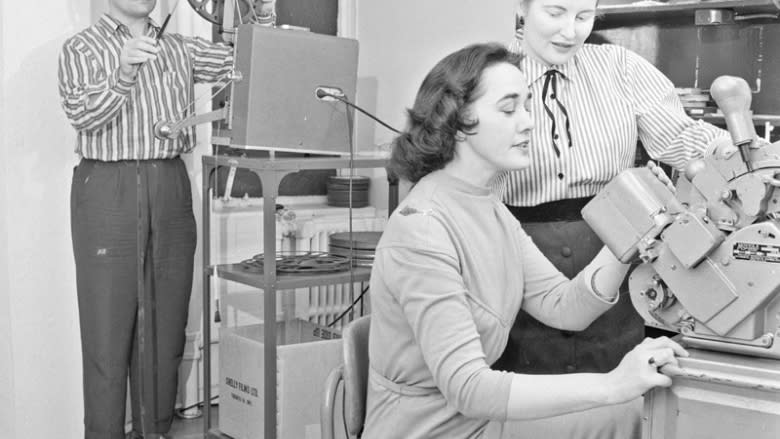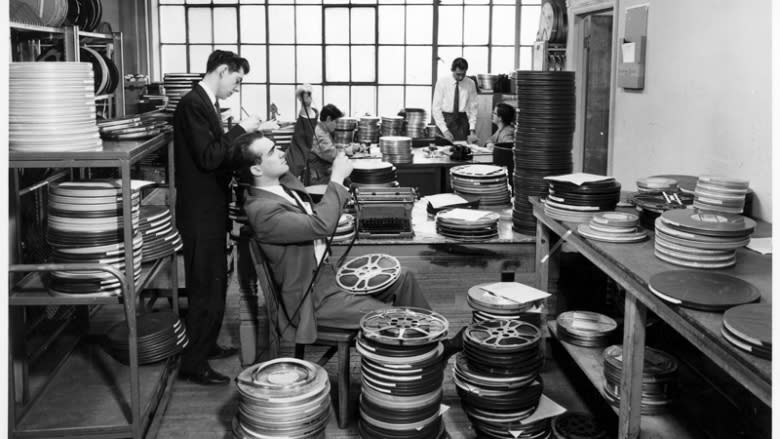Cambridge Five spy interview unearthed by CBC archives
CBC has unearthed archival footage of Guy Burgess, the British turncoat who was one of the “Cambridge Five,” who spied for the Soviets during the Second World War and into the 1950s.
The footage, which was discovered in CBC’s film archives, is a nine-minute interview with Burgess from 1959. Up until now, only a few images existed of Burgess after his defection to Moscow in 1951.
The newly found interview is likely to be of special interest to the British public, which has had a longstanding fascination with the Cambridge Five, as evidenced in countless books and films about the group.
“I had watched so many documentaries about the cold war, about spying in England, and I know they are crazy about it,” said Arthur Schwartzel, adding it’s the biggest find in his 23 years working as a CBC archivist.
The story of Burgess and his Cambridge Five colleagues has long captured the imagination of the British public.
Burgess, along with Donald McLean, Anthony Blunt, John Cairncross and Kim Philby, made up perhaps the most famous and most romanticized spy ring in history. All five attended Cambridge University in the 1930s, where they seem to have developed a strong social conscience and a sympathy for socialism.
They were considered part of the elites in British society, and after university held positions at the BBC, the Foreign Office and even the spy agency MI6 -- all while working as Soviet spies.
The ring began to collapse in 1949, leading to Maclean and Burgess’s defection in 1951 to the Soviet Union. The Cambridge Five caused great embarrassment and damage for the political and intelligence communities on both sides of the Atlantic.
There are hundreds of books and films inspired by the story of the Cambridge Five; Burgess himself has been played by actors such as Rupert Everett, Tom Hollander and Benedict Cumberbatch.
Film kept in cold storage
The newly unearthed interview was found among the 94,000 film canisters held in cold storage in the basement of the CBC’s English head office in Toronto.
Much of the material there has been catalogued, but for some reason the Burgess interview was not itemized until 2011, when the film was transferred to tape.
The person who catalogued it in 2011 did not flag the discovery as a news story.
Schwartzel came across the name while doing a search for archival footage from the Cold War, and alerted CBC’s national archivist, Greg Hobbs, who then brought it to the attention of CBC reporter Adrienne Arsenault.
The newly unearthed interview was shot in January 1959 by Canadian cameraman Erik Durschmied in Moscow, who delivered it to editors at the CBC program Close-Up, a precursor to This Hour Has Seven Days.
It appears to only have aired once, on that program, on March 11, 1959, and there’s no explanation at this point about why it has never aired in England.
Licensed to BBC
CBC has licensed the newfound material to the BBC, which will run a feature story about the uncovered Burgess interview tonight on its current affairs program, Newsnight.
CBC has shown the interview to several spy watchers in London who were baffled as to why it had never been uncovered before. They found it added a bit of a new chapter to their knowledge of Burgess.
“I thought it was a fascinating piece of film and to me it underlined the impression that by… this point, Burgess really is a very unstable character,” said Gill Bennett, former chief historian of the Foreign Office in London.
In the interview, Burgess talks about his interest in returning to London, his love of cars and his socialist bent.
“I want to live in the Soviet Union because I am a socialist and it’s a socialist country. And I enjoy doing so,” he said in the interview, in which he also mentions that he’s one-quarter Canadian.
Burgess died an alcoholic, in Moscow, four years after this interview aired.
The back story on the Guy Burgess interview
By Greg Hobbs, CBC senior media librarian
Keeping track of what’s on 94,000 film canisters in a library that was created before our modern computer systems were in place is a monumental task. Some of the stories that fall through the cracks are bound to be significant.
Such is the case with the 1959 Guy Burgess Interview.
The interview was shot by freelance reporter-cameraman Erik Durschmied, who had recently made news for interviewing Cuban rebel leader Fidel Castro in the hills outside Havana prior to the revolution.
Durschmied was in Moscow with Pierre Berton shooting a piece about life behind the Iron Curtain when he received a tip about Burgess’s whereabouts. Durschmied made contact, sat Burgess down on a cemetery bench and convinced him to tell his side of the story while the camera rolled.
Lost in the archives
Despite the scoop, the Burgess interview was not the top-billed story on Close-Up the night it aired. The nine-minute interview ran between an all-male discussion about women’s role in society and an interview with poet Dame Edith Sitwell.
As far as we can tell, when the film of the program was originally archived, the description on the canister read only “Close-Up with Dame Edith Sitwell.”
In 2004, as part of a legacy preservation project, CBC made a video tape transfer. In 2011, a library cataloguer viewed the item and thoroughly documented its content, but the significance of the footage wasn’t discovered until CBC archivist Arthur Schwartzel came across the film.
Clarification : The video that accompanies this story was not authorized to be published before 5:30 p.m. ET. It was accidentally added when the story was first posted, and then temporarily removed until the appropriate publishing hour.(Feb 23, 2015 5:45 PM)


